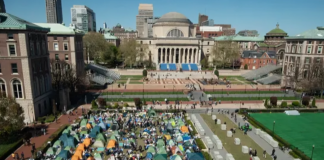Tehran – This week’s decision by Iran’s Guardian Council to ban virtually all political pragmatists and reformists from running in upcoming parliamentary and Assembly of Experts elections makes conflict with Israel and its allies all but inevitable. The move cements hardliners’ total control over the levers of power in the Islamic Republic and points to a more confrontational foreign policy going forward.
At issue are both the parliamentary vote on March 1st as well as elections for the 88-member Assembly of Experts, which will select the next Supreme Leader to replace the ailing 85-year old Ayatollah Ali Khamenei. Reformists favoring improved relations with the West have been barred from elections for years, but this latest sweep is unprecedented in its scope and audacity. Prominent figures like former president Hassan Rouhani and former parliamentary speaker Ali Larijani, long considered regime stalwarts, were shockingly disqualified.
The Guardian Council, which vets candidates on behalf of the Supreme Leader, has essentially cleared the field of any serious opposition to the hardliners. This has led to record low turnout in recent votes, with some districts seeing single digit participation compared to 70% just a few years ago. Hardliner Ebrahim Raisi won the 2021 presidential race with just 18 million votes, far less than his rivals earned in 2017 when the contest was more open. He prevailed only because the deck was stacked in his favor.
The pragmatists once in power advocated for outreach to the West, believing it was in Iran’s tactical interest to negotiate sanctions relief and improve relations. They were more open to curbing the country’s adventurism in places like Syria and Iraq to achieve these goals. While no fans of Israel or America, they saw opportunity in flexibility rather than ideological rigidity.
A Renewed Nuclear Deal Slips Away
Had the pragmatists remained in control, experts believe a renewed nuclear agreement was likely. Iranian and American negotiators apparently agreed on some 90% of the contours of a potential deal before talks broke down. Israel would have disliked any sanctions relief for Tehran, but with Russia and China already helping Iran blunt the impact, there were benefits to be had from an agreement. It could have rolled back the country’s uranium enrichment and kicked the nuclear can down the road for a few more years.
But with Raisi and the hardliners now consolidated in power across all levers of government, the prospects for a new accord are dead. These fundamentalists see compromise with the West as weakness. They are committed to aggressively expanding Iran’s nuclear program, reportedly enriching uranium to levels required for multiple weapons. Installing compliant regimes in places like Syria and Iraq is part of their vision of Iranian regional hegemony. Support for terrorist proxies abroad will continue apace.
In short, the hardliners now directing Iranian policy view flexibilty as fundamentally incompatible with their ideology. They will govern ruthlessly at home and conduct a defiant, confrontational foreign policy abroad. Their grip on power looks set to strengthen further when the Assembly of Experts taps a successor to Khamenei, who is said to be in poor health. Raisi is rumored to be the front-runner, which could make him Iran’s paramount leader for years or even decades to come.
Glimmers of Hope?
Yet there are glimmers of hope that Iranians themselves may grow weary of the hardliners’ repression and adventurism.
The dismal turnout in recent elections shows citizens rejecting the political farce whenever possible. Hundreds of thousands of Iran’s best and brightest continue to emigrate each year in search of opportunity abroad, tired of their government’s antagonism toward the wider world. The pious Iranian people remain devout in their faith but question whether religion and state need be so intertwined.
The bravery of Iranian women in challenging mandatory head coverings after the tragic death of Mahsa Amini shows the regime does not have an iron grip on society. Nor is the vaunted Islamic Revolutionary Guard Corps immune from internal dissent in the ranks. Anti-regime protests erupt periodically, revealing an undercurrent of profound unease with the direction the revolution has taken.
Israel and its allies will need to navigate carefully in the years ahead. A permanent confrontation with an aggressive Iran aligns perfectly with the hardliners’ narrative. But equally, the West cannot ignore dangerous provocations or live under the threat of a nuclear-armed Tehran. There are still avenues for sanctions and pressure short of outright conflict, and these should be vigorously pursued.
Perhaps most importantly, the free world should support the Iranian people themselves in seeking a more moderate path. The hardliners offer a bleak future of repression at home and violence abroad. But if Iranians can recover the democratic promise that first animated their revolution decades ago, they yet have the power to change course and reject the fundamentalists hurtling them toward deeper international isolation. The road ahead will be difficult, but the Iranian people deserve partners in the West to help light their way.





















